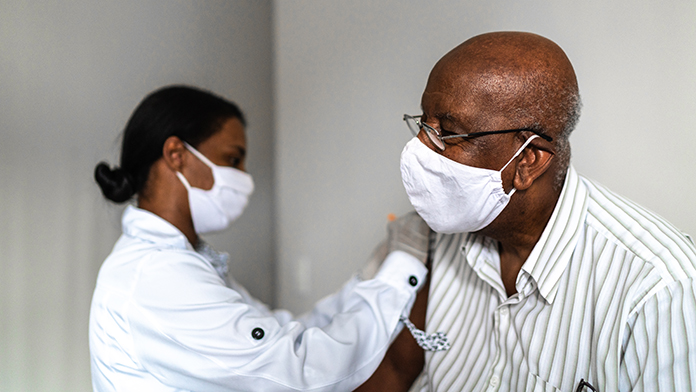The information you will be accessing is provided by another organization or vendor. If you do not intend to leave our site, close this message.
D-SNP home page > Health tips & tools > 8 other vaccines you may need (besides COVID-19)
8 other vaccines you may need (besides COVID-19)
Routine shots aren’t just for kids. Here are the ones you may need as an adult.
 By Stacey Colino
By Stacey Colino

The COVID-19 vaccine has gotten a lot of attention lately. And for good reason: It may keep people from getting the virus or becoming very sick from it. But at the same time, people are avoiding other important vaccinations. In fact, 47 percent of adults have put off or canceled health care services, such as getting vaccines, during the pandemic.1
That can be a mistake, experts say. You should not postpone certain medical visits or procedures. Routine vaccinations for adults are high on that list. (The same goes for getting emergency care for symptoms such as chest pain or difficulty breathing.) “Vaccines are meant to protect public health and prevent disease,” says Hiten Patel, MD, MPH. He’s an assistant professor of family medicine at the Ohio State University Wexner Medical Center. And they do a good job of protecting people. But only if you get them when you should.
Below are the vaccines adults should have. Of course, it depends on your age and other key factors. To find out if you’re overdue for any on the list, check your vaccination record. It includes a history of all the vaccines you got as a child and adult. Can’t find it? Your doctor may have a vaccine history in your medical records. Your state health department may also have registries that include adult vaccines. The Centers for Disease Control and Prevention (CDC) has a list of registry contacts and websites. If you still can’t find your record, your doctor can share the right vaccination schedule.
- Influenza (flu): Everyone over the age of six months should have a flu shot each year, ideally in September or October.2 “It reduces the likelihood of getting influenza. And if you do get it, you’re less likely to get seriously ill,” Dr. Patel says. People aged 65 or older have a greater chance of catching the flu and developing complications. So they should get a high-dose version. It has four times as much antigen as the regular shot.3,4
- Tdap: This vaccine can protect you from three illnesses: tetanus (lockjaw), diphtheria and whooping cough (pertussis). Diphtheria is a serious bacterial infection. It can cause breathing trouble and heart failure.5 People usually get their first dose of Tdap at age 11 or 12. After age 19, you should have one dose of Tdap, then a Tdap or Td shot every 10 years. Also, women should get a Tdap dose during each pregnancy.6 Never got it? You should have it as soon as possible.
- MMR: You usually get the measles-mumps-rubella (MMR) vaccine as a child. It can prevent all three of these contagious diseases. The first dose happens at 12 to 15 months. You’ll get the second dose at 4 to 6 years of age.7 Once you’ve had the full series of vaccines, there’s no need to update them, Dr. Patel says. Immunity may wane in some people, though. Your doctor may check antibody levels. If you’re low for MMR, you may need a repeat vaccine.
Adults who’ve never had the MMR vaccine should get at least one shot. There are a few exceptions. For instance, pregnant women should wait until after they’ve given birth.8 Your doctor can tell you if it’s right for you.
- Varicella: You might not have heard of the varicella-zoster virus, but you’ve heard of what it causes ‒ chickenpox. It’s highly contagious. But we have a strong defense against it. Two doses of the varicella vaccine are about 90 percent effective. Doctors give it during childhood, usually by age 6. If you are over age 13 and have never had chickenpox or the shot, the Centers for Disease Control and Prevention suggests getting it when you can.9
- Shingles: This condition is a reactivation of the same virus that causes chickenpox.10 It comes with a painful rash and blisters, usually on one side of your torso.11 The shot can prevent shingles and complications such as long-lasting nerve pain. The newest vaccine (Shingrix) has two doses. It’s given two to six months apart to adults 50 and older. After that, you’re protected for life.
“If you got the older shingles vaccine before 2017, you’re still eligible for Shingrix, which is much more effective,” Dr. Patel says. Keep in mind: It may have side effects. These might include body aches, fever and fatigue that last one to two days.
- Pneumococcal: This bacterium can cause pneumonia and meningitis. These infections can be especially harmful at older ages. That’s why adults age 65 and older should get the PPSV23 vaccine. (In some cases, a doctor may also suggest a second vaccine, PCV13.) “Adults under 65 should get it if they have a history of diabetes, cardiovascular disease, hypertension, lung disease, alcoholism, immunocompromising conditions (such as HIV) or chronic hepatitis,” Dr. Patel says.
- Meningococcal: These days, kids are ages 11 to 12 when they get the first dose of this vaccine. Then a booster at age 16.12 It helps prevent meningococcal disease. Most adults don’t need it, Dr. Patel says. But it may be a good idea if you’re traveling to a part of the world where bacterial meningitis occurs more often.
- HPV: The human papillomavirus (HPV) is a leading cause of cervical, throat and rectal cancer. The CDC recommends that anyone between the ages of 11 to 26 get a series of HPV vaccines. That’s two doses for 11- to 14-year-olds and three doses starting at age 15. Recently, the CDC approved the vaccine for adults ages 27 to 45.13 If that’s you, ask your doctor if you should get the vaccine. It may be especially important if you’re dating or have multiple sexual partners.
Finally, if you haven’t gotten the COVID-19 vaccine, talk to your doctor about whether you should get it. And if you need more than one vaccine, ask your doctor about the best ways to space them out. You can create a vaccination schedule together. That way you can get the biggest immune-building bang from each one.
1American Psychological Association. Stress in America™: one year later, a new wave of pandemic health concerns. March 2021. Accessed July 1, 2021.
2Centers for Disease Control and Prevention. There are vaccines you need as an adult. May 2, 2016. Accessed on July 1, 2021.
3Centers for Disease Control and Prevention. Who needs a flu vaccine and when. June 11, 2021. Accessed on July 1, 2021.
4Tosh PK. Mayo Clinic. High-dose flu vaccines: how are they different from other flu vaccines? April 23, 2021. Accessed on July 1, 2021.
5Centers for Disease Control and Prevention. Diphtheria. January 19, 2021. Accessed on July 1, 2021.
6Mayo Clinic. Vaccines for adults: which do you need? March 4, 2021. Accessed on July 1, 2021.
7Centers for Disease Control and Prevention. Measles vaccination. January 26, 2021. Accessed on July 1, 2021.
8Centers for Disease Control and Prevention. Measles, mumps, and rubella (MMR) vaccination: what everyone should know. January 26, 2021. Accessed on July 1, 2021.
9Centers for Disease Control and Prevention. Chickenpox vaccination: what everyone should know. August 7, 2019. Accessed on July 1, 2021.
10Mayo Clinic. Shingles. October 6, 2020. Accessed on July 1, 2021.
11Centers for Disease Control and Prevention. Shingles vaccination: what everyone should know about the shingles vaccine (Shingrix). January 25, 2018. Accessed on July 1, 2021.
12Centers for Disease Control and Prevention. Meningococcal vaccination. July 26, 2019. Accessed on July 1, 2021.
13Centers for Disease Control and Prevention. Human papillomavirus (HPV) vaccination: what everyone should know. March 17, 2020. Accessed on July 1, 2021.
Disclaimers
This material is for informational purposes only and is not medical advice. Health information programs provide general health information and are not a substitute for diagnosis or treatment by a physician or other health care professional. Contact a health care professional with any questions or concerns about specific health care needs. Providers are independent contractors and are not agents of Aetna. Provider participation may change without notice. Aetna is not a provider of health care services and, therefore, cannot guarantee any results or outcomes. The availability of any particular provider cannot be guaranteed and is subject to change. Information is believed to be accurate as of the production date; however, it is subject to change. For more information about Aetna plans, refer to our website.



